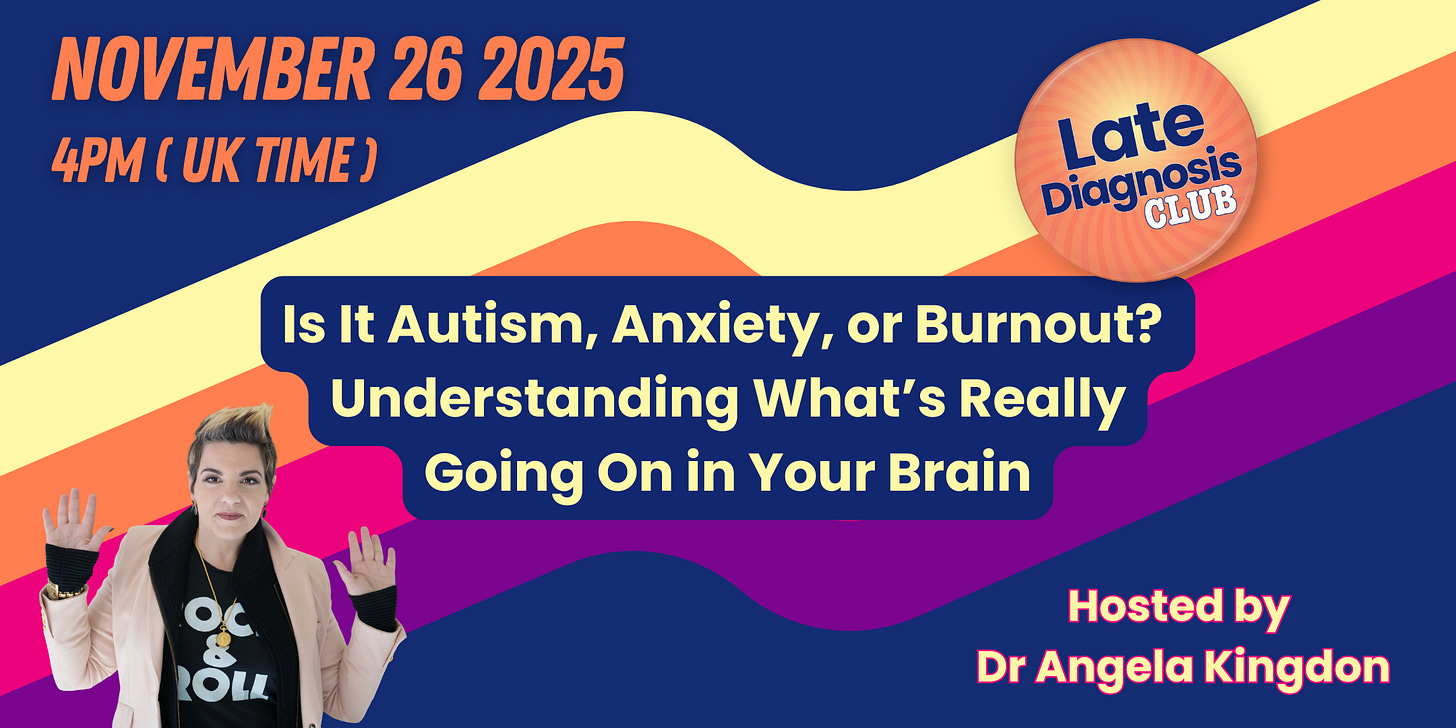How CBT-Inspired “Life Coaching” Pushed Me Into Autistic Burnout
The story of how I learned to distinguish between my Autistic traits, my crippling anxiety, and Autistic burnout and how each needs different tools of care.
Before I knew I was Autistic, I spent several years in a style of life coaching that promised transformation, emotional mastery, and the ability to “manage my mind.” The method was clean, elegant, and certain. Very, as it turns out, attractive to my Autistic need for certainty and black and white thinking. This type of Life Coaching (called Self-Coaching 101) was based on the idea that circumstances are neutral, thoughts create feelings, feelings drive actions, and actions create results. If something in your life wasn’t working, you were taught to find the thought causing it and replace it with something better.
I wanted that clarity. I wanted a way to stop feeling overwhelmed by people, noise, chaos, and the sheer difficulty of being alive inside my own nervous system. So I became a committed student. I took notes, attended workshops, practiced the tools, and repeated the coaching mantra to myself: nothing outside you can cause your feelings; it’s always your thoughts.
But, I didn’t know yet was that I was Autistic and I even when I found out I was Autistic I didn’t know how dangerous this approach would be for me. What I also didn’t know was that most life coaching is built on the same cognitive frameworks as traditional cognitive behaviour therapy, which Dr. Alice Nicholls describes as being “designed to suit a neurotypical thinking style.” If therapy asks you to identify your emotions, analyze your thoughts, challenge your interpretations, and shift perspective, life coaching asks you to do the exact same thing, but faster, with more pressure, and often without any clinical awareness of autism or burnout. Keep in mind I have severe alexithymia, difficulty identifying and describing feelings.
Nicholls notes that “most therapies rely on people being able to recognise and report their mood,” and that about half of autistic adults struggle with this. Life coaching assumes the same thing: that you can pinpoint an emotion, name it, map it onto a thought, and change it at will. When I couldn’t identify my emotions, I took this as evidence I was broken, or as my coached explained it, I was “being a victim.” So I learned quickly how to mimic what the other life coaching students were doing and saying that got praise from our coach and I copied those.
Thought Work As High Level Masking
I wasn’t resisting coaching. Coaching was teaching me to override every signal my autistic brain and body were trying to give me.
I didn’t recognize the signs because I had been trained, from childhood onward, to perform socially, hide discomfort, and keep going long after I was exhausted. Life coaching simply gave me a more sophisticated vocabulary for the same old masking. Instead of saying I was fine, I now said I was choosing a better thought. Instead of recognizing burnout, I chided myself for having “monkey mind” or choosing “drama.” I treated sensory overwhelm as a mindset issue. I believed that if I just worked harder on the right thought, everything painful would resolve. In one example, I was struggling with a co-worker who whistled all day and I was having what I now can see were sensory-related meltdowns and somatic stomach issues. My coach told me to choose a better feeling thought, when the right option would have been to buy some noise cancelling ear plugs, or better yet, to advocate for my employer to get them for me!
Another problem was goal-setting. Nicholls writes that unadapted therapy can “mislabel normal autistic behaviour as disordered neurotypical behaviour.” Life coaching did the same, but with a motivational spin. Avoiding loud, unpredictable social situations wasn’t sensory self-protection; it was a “limiting belief.” Preferring routines wasn’t an autistic processing need; it was “rigidity.” Asking for clarity wasn’t communicative precision; it was interpreted as “needing certainty.”
Coaching didn’t teach me to understand my body — though my coach was always hammering on about that. For me though, as an unidentified Autistic person, what it taught me was to monitor my thoughts so I could start masking sooner.It was like I was trying to get in front of my Autistic nature. Every Autistic trait I had was reinterpreted as something I needed to challenge, correct, or outgrow. Thought work became a method of self-erasure that I was so proud of. Nicholls writes that Autistic people often need longer processing time, clearer communication, and therapy that accounts for sensory, cognitive, and emotional differences. Coaching offered none of that. It offered speed, certainty, and the belief that if you just apply the tools harder, you will get results. And with effort, coaching got great results for me, in a way. On average people liked me a lot more when I performed neuronormativity better. The coaching world rewarded my skill at masking. I appeared confident, articulate, motivated, and insightful. I could analyze situations endlessly. I sounded good. That was part of the problem. I was praised for my mindset work while my health deteriorated.
Burnout Dressed Up As A Motivation Issue
The problem was that as I finally learned how to excel at all this expert level masking that life coaching taught me, my life force was being zapped out of me. Turns out pretending to be someone else all day is a fast path to Autistic Burnout. Nicholls explains that Autistic burnout “may be interpreted as depression,” and that approaches designed for depression often involve “gradually increasing the person’s activity levels,” which can make burnout worse. Coaching isn’t depression treatment, but it uses the same assumption: take more action. Increase your output. Change your results. Do the things you’re avoiding. Manage your mind around the obstacles. Check. Check. Check.
Coaching taught me that suffering meant my mindset needed work, not that my body was collapsing under the weight of a lifetime of masking. I pushed. I tried to outthink neurological exhaustion. I tried to override shutdown with determination. I tried to “feel on purpose” when my nervous system had gone offline entirely. My amazing doctor prescribed anti-depressants that absolutely did not help and my amazing therapist upped the anti on cognitive behavioral therapy and my burnout turned into suicidal ideation and actual disability.
The truth is that a lot of Autistic people feel like coaching failures when the real problem is the coaching framework itself. If you’re Autistic, you may struggle to identify emotions, shift perspectives on demand, generate alternative interpretations, or “choose a thought” that contradicts your sensory reality. That isn’t resistance. It’s neurology.
When I finally learned what it meant to accept my Autistic nature and stop fighting it, everything snapped into place. The tools I had been using were built for someone else’s brain, someone else’s sensory world, someone else’s way of feeling and knowing. Coaching taught me to doubt my body and reinterpret my burnout as a thought error. Identifying as Autistic (with a capital A) taught me to trust myself again.
Coaching Is Not Evil But It Was Not Built For Us
I don’t believe coaching is harmful by definition. I believe it is harmful when it demands that people fix a problem they don’t have. For instance, when it reframes Autistic traits as thoughts to be overridden; when it turns burnout into a failure of mindset; or when it treats emotional or sensory needs as something that can be adjusted to with enough exposure or grit.
I didn’t need a more powerful thought. I needed a more truthful framework. One that recognised Autistic burnout, acknowledged sensory overwhelm, respected cognitive style, and didn’t require me to mask in order to be seen as “improving.” I needed support that treated my Autistic mind and body as real. If coaching has made you exhausted, confused, or ashamed of your needs, you’re not alone. You’re not broken. And you’re not resisting growth. You might simply be Autistic in a system that hasn’t learned how to recognize you yet.
CBT didn’t help me (personally) but Autistic burnout led to me studying the brain and what techniques do work. (Hint: It’s very personal.) I’m going to be sharing what I learned in a workshop for our Late Diagnosis Club members. If you are a paying member of this substack, you are invited for free. If you want to join us there are a few ticket options including 5 free tickets for those who can’t afford the £4.44 price tag and a pay what you can option.
About the workshop
Next week, I’m getting a few Late Diagnosis Club together to breakdown my research about the overlapping areas of autism, anxiety, and Autistic burnout.
Here’s what we’re going to do, step by step:
We’ll start by breaking down what’s really going on when your body and brain are in overdrive — is it autism, anxiety, or burnout (or all three at once)?
You’ll learn a simple framework to tell the difference between sensory overwhelm, emotional overload, and nervous system shutdown.
We’ll look at the signs that most people miss, so you can stop wondering if you’re “just anxious” and start understanding what your brain is actually asking for.
You’ll map your own patterns using the worksheet we’ll send before the session, so you leave knowing what triggers you, what calms you, and what recovery really looks like for you.
By the end, you’ll have a personal guide for decoding your stress cycles and a plan to manage them before they turn into full burnout.
My promise: If you join us, you’ll have new tools the identify and address your dysregulation.






So glad you wrote this. I have maybe an extreme position on life coaching. The only expert on my autistic life is... Well, me.
We're all different. So I'm the only expert. If the "coach" is autistic, well, there may be two experts in the room. But only on our own individual lives.
We may be able to learn... from each other. Which might... might... be worth paying for??
But the power dynamics and utility of that? Aren't worth it.
For me.
Ymmv.
But I'm glad you wrote this, my friend.
This is exactly what happened to me! I made a whole episode of my sitcom about it! The failure of CBT techniques with autism patients, that is: https://open.substack.com/pub/republicofidiots/p/episode-04-heat-deth